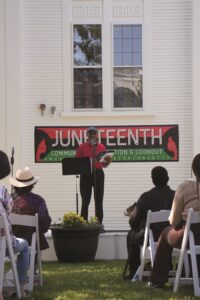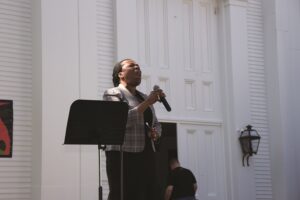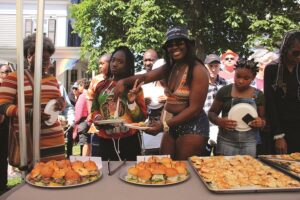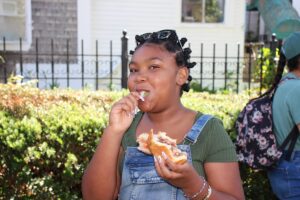PROVINCETOWN — “Today we celebrate the emancipation of Black and brown people who were told they were free,” said David Wilson, a Provincetown community activist and plaintiff in the landmark case Goodridge v. Dept. of Public Health, which legalized gay marriage in Massachusetts. “Words mean a lot,” he said. “But what really matters to me is what’s happened since we were told we were free.”
Wilson was speaking to a crowd of more than 100 at the town’s third annual celebration of Juneteenth on Monday afternoon on the lawn of the Unitarian Universalist Meeting House.

It was a day that honored the advances of Black Americans in their ongoing fight for freedom and reminded the community of further steps that remain to achieve true equality.
Provincetown’s Juneteenth included a Yoruba ancestor ceremony led by Ngina Lythcott, a prayer by Pastor David Brown of the Chapel on the Pond in Truro, a poem by Provincetown eighth-grader Zanae Barrett, rousing speeches by several community organizers, a powerful performance of the gospel song “I’m Free” by Carlene Brown, performances by drag queens, and a cookout.
Juneteenth, which became an official federal holiday in 2021, celebrates the June 19, 1865 order by Union General Gordon Granger in Galveston, Texas that announced, two and a half years after the emancipation proclamation was signed, that all enslaved Texans were free.
Wilson’s speech examined whether that 1865 declaration of freedom had been more than hollow words. Describing the continual discrimination his parents faced throughout their lives, he said, “My parents married and moved to Boston. They were greeted by ‘No Blacks need apply.’ After several months of rejection, they began a journey of 30 years working for white families west of Boston. Very little money. All cash.”

Wilson said that it wasn’t until the Civil Rights Act of 1965, 100 years after Union soldiers marched into Galveston, that his parents could get consistent work. “My parents were 51 and 49 and finally had a paycheck,” he said. “They worked for another 25 years to earn enough money to have an apartment, to put credits and quarters into Social Security, but because they did not have the credit they needed, they never owned one thing other than a car.
“And I ask myself, were they free?” Wilson said. “They passed that journey to be more free to their only son, who stands in front of you now.”
Wilson talked about what it has been like to carry his family’s quest for freedom to the streets of Provincetown. “I’m asked on a regular basis here in Provincetown, ‘Do you live here? Do you live in this building or are you a worker?’ ” he said.
“I’m the father of three adult children, seven grandchildren, and three great-grandchildren,” he said. “And I worry every day about their safety as they drive to work or walk to school while Black.”
After a pause, he continued: “I ask myself, am I free?”
Wilson left those listening with a challenge. “I’d like to propose to all of you to join me in bringing back the abolitionist movement,” he said. “That movement was organized to abolish slavery, but I think the real job is to give us freedom for all the future generations, so someday, we will all be free.”
Wilson received a standing ovation.

State Rep. Sarah Peake, who lives in Provincetown, also spoke to the crowd. “As I’m looking at my notes, it begins with ‘Happy Juneteenth,’ because we’re going to dance,” she said. “We’re going to eat some wonderful food. We’re going to have a community gathering. But Juneteenth offers us the opportunity to think and to look at what has happened in this country.”
Peake talked about the violence and discrimination Black Americans have faced since that first Juneteenth in 1865 and acknowledged that it continues: “There is a systemic boot on the collective neck of the Black community here in the United States of America and here in Massachusetts.”
Donna Walker, Provincetown’s director of diversity, equity, and inclusion, addressed the crowd with a call to action. “As we celebrate Juneteenth, we should recall that the fight for freedom and equality is not finished,” she said. “Let us exult in the progress that we have made but also keep in mind the work that still needs to be done.”

Recent Provincetown Schools eighth-grade graduate Zanae Barrett brought the speeches full circle to where action comes down to the personal. She read her poem “Me,” with the lines, “Every little thing about me makes me unique in my own way. I love my glowing skin. Nothing will change that.”



